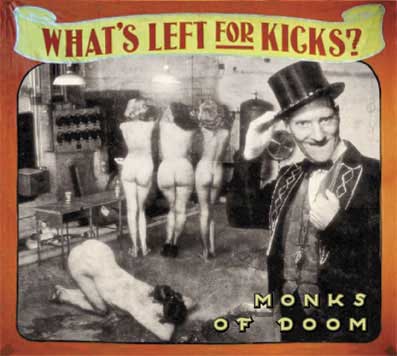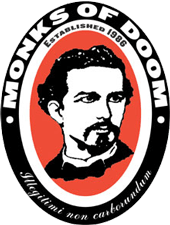 ACT 1, SCENE 1
A basement in Brooklyn. Saturday.
ACT 1, SCENE 1
A basement in Brooklyn. Saturday.
GRANDFATHER: Who in the basement makes such noise?
YOUNG BOY: Methinks should I, ere this box opn'd
T'would suffer most grievous shellacking
Yet respond I must and feign surprise
Ho, Grandfather, 'tis I that ventured
To this most subterranean homesick place.
GRANDFATHER: Ay, t'were foretold one day the boy would come
To find the discs that music play'd
To rent the air with kitt'nish
pseudo-jazz
and end these years of peace
My heart darken'd. O lost!
YOUNG BOY: Yet who hailed as king 'mid these ancient tunes?
GRANDFATHER: Dare speak I not, nor say the name
'Tis now struck twelve; get thee to bed, lad.
YOUNG BOY: For this relief, much thanks: 'tis bitter cold,
And I am sick at heart.
GRANDFATHER Fear not the turgid trembl'ng within thy bowels
'Tis but Grandma's chili racing for the exit.
They both laugh.
The doorbell rings. Grandfather opens the door
Enter two friends of Grandfather -- Marcel and Fellatio
YOUNG BOY: What, is Fellatio there?
GRANDFATHER: Welcome, Fellatio: welcome, good Marcel.
MARCEL: What, has this thing dost appear'd again to-night?
GRANDFATHER: I have witness'd naught.
MARCEL: Fellatio says 'tis but our fantasy,
And will not let belief take hold of him
Of
this dread music, twice heard of us:
Therefore I have entreated him along
With us to listen the minutes of this night;
As
new year's eve in a haunt'd house
That if again this apparition cometh,
He may approve our eyes and speak to it.
FELLATIO: Tush, tush, 'twill not appear.
GRANDFATHER: Sit down awhile;
And let us once again assail your ears,
As the
kittenish pseudo-jazz doth assail ours
That are fortified against our story
What we have two nights heard.
FELLATIO: Well, sit we down,
And let us hear Grandfather speak of this.
GRANDFATHER: Last night of all,
When yond same star that's westward from the pole
Had made his course to illume that part of heaven
Where now it burns, Marcel and myself,
The bell then beating one,--
Enter Ghost of Raymond Scott
MARCEL: Peace, break thee off; look, where it comes again!
GRANDFATHER: In the same figure, good radio's hit parade.
MARCEL: Thou art a scholar; speak to it, Fellatio.
GRANDFATHER: Looks it not like the bandleader? Mark it, Fellatio.
FELLATIO: Most like: it harrows me with fear and wonder.
GRANDFATHER: It would be spoke to.
MARCEL: Question it, Fellatio.
FELLATIO: What art thou that usurp'st this time of night,
Together with that fair and warlike form
In which the majesty of
Shirley Temple
Did sometimes march? By heaven I charge thee, speak!
MARCEL: 'Tis offend'd.
GRANDFATHER: See, he stalks away!
FELLATIO: Stay! speak, speak! I charge thee, speak!
Exit Ghost
MARCEL: 'Tis gone, and will not answer.
GRANDFATHER: How now, Fellatio! You tremble and look pale:
Is not this something more than fantasy?
What think you on't?
FELLATIO: Before my God, I might not this believe
Without the sensible and true avouch
Of mine own eyes.
MARCEL: Nor would I aver
The entire quintette, should they arise.
FELLATIO: As thou art to thyself:
Such was the very tux he had on
When he the ambitious cartoon scor'd;
So frown'd he once, when, in an angry parle,
He smote the
grievous saxophone man.
'Tis strange.
MARCEL: Thus twice before, and jump at this dead hour,
Thus
pow'rhous'd hath he gone by our watch.
FELLATIO: In what particular thought to work I know not;
But in the gross and scope of my opinion,
bodes bumpy weather o'er the new ark.
MARCEL: Good now, sit down, and tell me, he that knows,
Why this same strict and most confusing watch
So nightly toils the subject of the land,
Among a fleet of brazen cabs,
And soothing sounds, the playful drummer;
Why such impress of stalling made, whose sore task
To score the moods of stutt'ring pigs and insane poultry?
What might be toward, that this sweaty haste
Doth make the reckless night with the day:
Who is't can inform me?
FELLATIO: That can I;
At least, the whisper goes so.
[to be continued ...]
by Don Brockway
 Summit, New Jersey, Christmas 1942: The "famous Raymond Scott Quintet, featuring Dorothy Collins," performs for a "Holiday Assembly" at the Masonic Hall. Article pasted in a scrapbook along with the original RSVP invitation and four photographs of the dance, in which one can barely discern a band in the distance. The dancers appear to be well-dressed, well-behaved teens; presumably this was a high school event, though no HS is identified.
Summit, New Jersey, Christmas 1942: The "famous Raymond Scott Quintet, featuring Dorothy Collins," performs for a "Holiday Assembly" at the Masonic Hall. Article pasted in a scrapbook along with the original RSVP invitation and four photographs of the dance, in which one can barely discern a band in the distance. The dancers appear to be well-dressed, well-behaved teens; presumably this was a high school event, though no HS is identified.








































